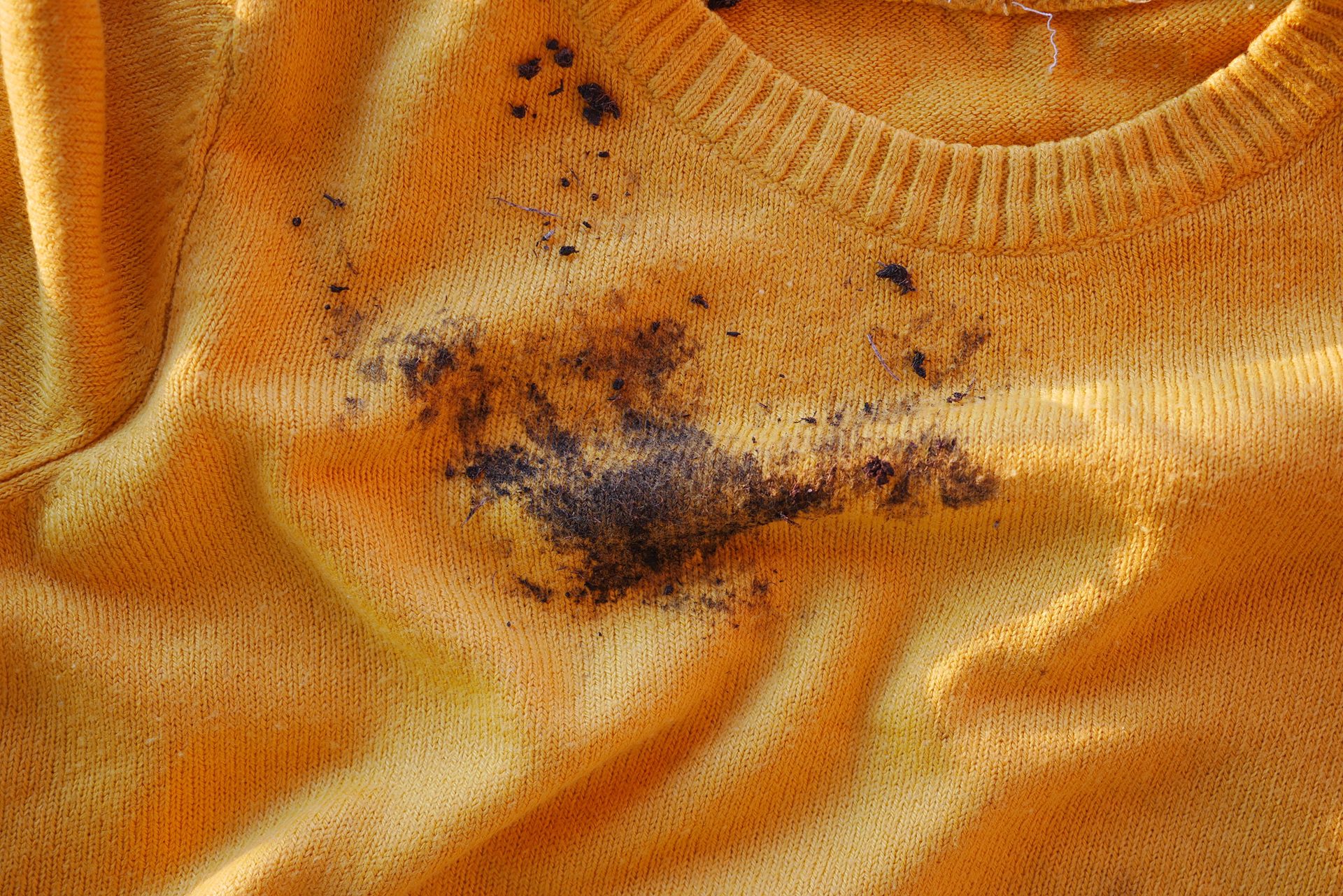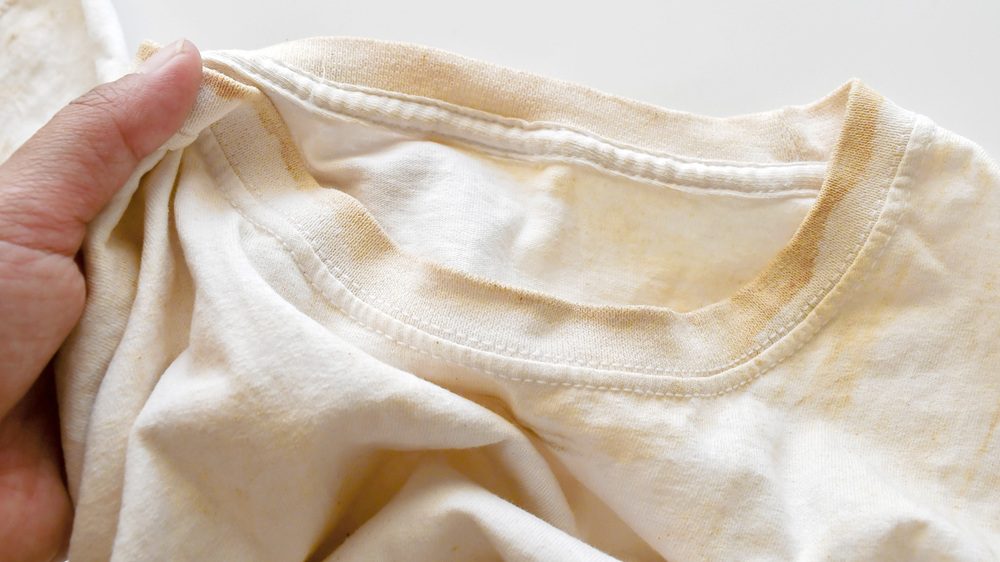
The challenge with stains is knowing how to treat them without making things worse. Anyone who’s scrubbed at a blotch of grease or splashed water on a wine stain has learned the hard way that not every trick works on every fabric. Some stains actually deepen, spread, or set when treated the wrong way. Delicate silks, bold colors, and tailored jackets raise the stakes even higher.
In this post, we break down the five stubborn stains that really call for dry cleaning, and at the same time, give you a clear picture of how dry cleaning works to handle them safely.
Grease and Oil-based Stains
Grease and oil-based stains are some of the most common marks people deal with. They often come from cooking oils, butter, salad dressings, or even makeup and skincare products. These stains tend to leave a dark, slick patch that clings to the fibers of the fabric. Sometimes they don’t look dramatic at first, but they can quickly become noticeable as the fabric absorbs the residue.
Why Detergents Can’t Remove Oil
- Water and oil naturally repel each other, so detergents don’t fully reach the stain.
- Hot water makes oils sink deeper into fibers instead of lifting them out.
- Scrubbing often enlarges the stain, leaving a dull patch on clothing.
How Dry Cleaning Solvents Work at the Molecular Level
- Dry cleaning solvents are nonpolar, just like oil, which allows them to bond and dissolve grease effectively.
- Pretreatment spotting agents are applied to target specific oils, whether from food or petroleum.
- Solvents penetrate fabric deeply without rough treatment, preserving delicate fibers.
Common Grease Stain Examples
| Source | Stain Type | Why It’s Difficult |
| Food | Salad dressing, butter, olive oil | Oils spread and leave shiny marks |
| Cosmetics | Lipstick, foundation | Pigments mixed with oils bond tightly to fibers |
| Machinery | Car grease, bike chain oil | Thick petroleum stains don’t wash out with water |
If you see an oily spot that refuses to budge, don’t risk home remedies. Knowing when to get clothes dry cleaned right away can keep the stain from becoming permanent.
Ink Stains from Pens and Markers
A pen leaking in your bag, brushing a marker against a sleeve, or even signing paperwork in a rush can leave its mark. These stains are recognizable by their strong, inky pigmentation and tendency to spread through the fabric. On lighter materials, they pop immediately; on darker fabrics, they create a dull patch that’s just as distracting.
Washable Ink vs. Permanent Ink
- Water-based ink: Found in washable pens and markers; may bleed during cleaning, but is easier to treat.
- Permanent ink: Found in ballpoint pens, fountain pens, or markers; bonds tightly to fabric fibers.
- Each type requires its own chemical approach that DIY methods can’t replicate.
Why DIY Fixes Often Fail
- Alcohol-based sprays spread ink outward, creating rings.
- Scrubbing drives pigments further into the weave.
- Home treatments can cause fading or leave permanent discoloration.
How Professionals Remove Ink Safely
- Spotting agents dissolve ink molecules without affecting fabric dyes.
- Solvents are carefully chosen for the ink type and garment fiber.
- Cleaners apply solutions with precision, especially on delicate fabrics like silk or wool.
Ink stains require expertise, not trial and error. Professional dry cleaners ensure the stain is treated properly the first time, keeping your clothes intact.
Wine and Beverage Stains
Spilling red wine at dinner or coffee on your morning commute is stressful because these drinks carry tannins that act like dyes. Tannins bind tightly to fibers and darken as they oxidize, making stains even worse if left untreated.
Coffee and tea also contain oils, which add another layer of difficulty. Instead of trying salt or soda water at home, it’s best to rely on professional dry cleaners who are experienced enough with how dry cleaning works for tannin-based stains.
Why Tannins Sink In So Fast
- Tannins act like natural dyes, soaking deep into fabric pores.
- Once oxidized, stains shift from red or brown to yellow, making removal harder.
- Oils in coffee and tea resist water, leaving behind shadows.
DIY Fixes vs. Dry Cleaning Treatments
- Blotting helps minimize immediate damage but doesn’t eliminate the stain.
- Club soda, vinegar, or salt may lighten, but they rarely remove tannins fully.
- Professional dry cleaners use pre-spotting chemicals designed specifically for tannin breakdown.
Examples of Beverage Stains Dry Cleaners Handle
- Red wine: quick to spread and notorious on light-colored fabrics.
- Coffee: leaves dark stains plus a lingering odor.
- Tea: sets quickly, often turning yellow if ignored.
With wine, coffee, or tea, time is everything. The sooner you use a professional dry cleaning service, the better your chances of saving the garment.
Blood and Protein-based Stains
Protein stains, like blood or sweat, are different from most because they solidify when exposed to heat. Rinsing with hot water or scrubbing aggressively can “cook” the proteins right into fibers. Even cold water at home may leave behind faint marks that resurface later. Professional cleaners use enzyme-based treatments and controlled temperatures to dissolve proteins safely.
Why Protein Stains Are So Difficult
- Proteins coagulate under heat, bonding tightly with fibers.
- Sweat and blood often have acidic properties that damage fabric over time.
- Traces can reappear even after home washing if not treated properly.
Don’t Do These at Home
- Using hot water, because it will lock in the stain permanently.
- Applying bleach because it will just damage the delicate fabrics without removing proteins.
- Scrubbing fibers as it will only cause wear and spread the stain.
How Dry Cleaners Treat Protein Stains
- Enzyme-based solutions target and break down proteins at the molecular level.
- Solvents and cycles are chosen to suit the garment’s fabric.
- Temperatures are carefully controlled to avoid setting the stain.
Protein stains require patience and the right chemistry. Professional dry cleaning ensures they’re dissolved without risking fabric damage.
Yellowing and Oxidation Stains

Stored clothing, especially whites, can develop yellow patches over time. This happens through oxidation – a chemical reaction between oxygen, body oils, or residues left behind. It’s most noticeable on wedding dresses, vintage garments, and heirloom linens. Unfortunately, bleaching at home often damages fabric without solving the problem.
What Causes Oxidation
- Long-term exposure to oxygen slowly breaks down fabric molecules.
- Sweat and body oils speed up yellowing, especially in armpits and collars.
- Improper storage (like sealed plastic bags) traps moisture, worsening discoloration.
Why Home Remedies Don’t Work
- Bleach weakens fibers and can make yellowing worse.
- Baking soda or vinegar only lightens stains temporarily.
- Vintage fabrics often get damaged by harsh home treatments.
How Dry Cleaners Restore Brightness
- Oxygen-based treatments gently lift oxidized residues.
- Specialized whitening processes revive delicate garments without harm.
- Restoration techniques bring back whites in dresses, silk blouses, and linens.
If your cherished garment has yellowed over time, professional restoration through a dry cleaning service can often give it new life.
Trust Omni Cleaners for Care That Goes Beyond Ordinary Laundry
When stubborn stains threaten your favorite garments, you don’t have to risk home remedies that might set them permanently. At Omni Cleaners, Houston’s premier dry cleaning service, we use fabric-specific techniques and eco-friendly solvents that dissolve oils, lift pigments, and restore delicate fibers to their original beauty.
With over 30 years of trusted experience and full DLI certification, we’ve built a reputation for handling even the most challenging stains. And here’s what makes it even easier: we offer complimentary Pickup and Delivery Service anywhere in Houston, Texas. From the moment you schedule a pickup to the moment your garments are returned, you can expect consistent quality, expert treatment, and care that truly honors your clothing.
Call us at (346) 567-7601, email us at info@omnicleaners.com, or stop by one of our convenient locations.